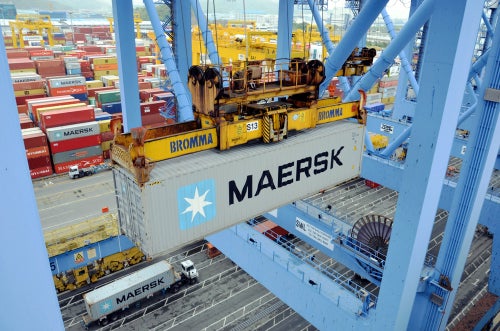
Maersk hopes its new net zero emissions target for 2040 will align the company with the net zero criteria set within the Science Based Targets initiative (SBTi) pathway to limit global warming to 1.5 degrees Celsius.
Net zero emissions targets for 2040
The targets go beyond previous efforts to reduce emissions related to the ocean fleet as they cover all direct and indirect emissions across the entire Maersk business.
AP Moller-Maersk CEO Soren Skou explains: “As a global provider of end-to-end logistics services across all transport modes, it is a strategic imperative for Maersk to extend our net zero ambition to the total footprint of the business. The science is clear, we must act now to deliver significant progress in this decade. These very ambitious targets mark our commitment to society and to the many customers who call for net zero supply chains.”
The targets include a societal commitment to act now and drive material impact in this decade, as well as a commitment to deliver net zero supply chains to customers by 2040.
The company also says it will invest in building a portfolio of natural climate solutions that will result in around 5m tonnes of CO2 savings per year by 2030.
2030 targets
To achieve its new 2040 goal, the company has also set realistic targets to be reached by 2030. These targets include a 50% reduction in emissions per transported container in the Maersk Ocean fleet and a 70% reduction in absolute emissions from fully controlled terminals. Depending on growth in the ocean business, the company believes this will lead to absolute emissions reductions between 35-50% from a 2020 baseline.
The company also plans to introduce a range of green product offerings that will add to its solutions, including Maersk’s Emissions Dashboard and Maersk ECO Delivery. Maersk hopes this will show that it is an industry-leading provider of green supply chain solutions covering ocean, air, contract logistics (warehouses and depots) and cold chain businesses. Its new products will use green technologies and solutions to ensure it provides real emission reductions within the supply chain.
Covering indirect emissions means the targets also address emissions from inland transport services and vessel building which are provided by third-party suppliers, Maersk says. Tackling this challenge will require extensive data insights and close collaboration with local and regional suppliers of products and services across the Maersk business footprint, it adds.
An outline of Maersk’s 2030 targets:
- Ocean: ~50% reduction in greenhouse gas emissions intensity.
- Terminals: ~70% absolute reduction of greenhouse gas emissions.
- Natural Climate Solutions used above and beyond 1.5 degrees Celsius target to build a portfolio that generates around 5m tonnes of CO2 savings per year by 2030.
- Ocean: 25% of all cargo transported using green fuels (defined as fuel or energy that have low or very low greenhouse gas emissions on a life cycle basis).
- Air: Minimum 30% of cargo transported using Sustainable Aviation Fuels (SAF).
- Contract Logistics (warehouses and depots) and Cold Chain: Minimum 90% green operations (Scope 1 and 2).
- Inland transportation: Industry-leading green offering – targets will be set during 2022.
Last month, sourcing giant Li & Fung agreed to form a long-term strategic partnership with Maersk – and struck a deal that would see Maersk acquire its logistics services provider, LF Logistics Holdings Limited in a deal valued at US$3.6bn.



